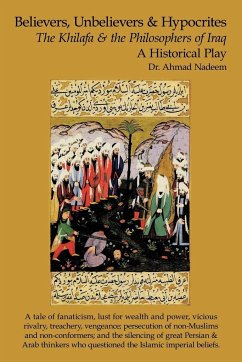After the death of Prophet Muhammad, first the Umayyads and then the Abbasids usurped the Islamic empire. These Arab tribes rivaled and intermittently massacred each other in their bid to rule Arabia and the captured lands. The Alids were the third contenders. The three tribes shared ancestry with the Prophet and coveted his political legacy. The play tells the story of how they ruled the conquered peoples of Arabia and Persia. Among the characters of this play, Wasil bin Atta, Jahm bin Safwan, and Ja'ad bin Dirham are regarded by historians as great philosophers. However, only Wasil died of natural causes while zealous rulers executed the latter two because of their skepticism about the Qur'an and the Islamic teachings as the word of God. Their critical analysis of these beliefs had led them to find logical contradictions between divine determinism and the eternal damnation of sinners. Their main thesis was that if everything happened by Allah's will, then it logically followed that sinners too were subject to Allah's will, and could not be condemned to hell. Likewise, the greatest scholars of Arabic prose and poetry, Ibn al Muqqafa, Abdul Hameed, and Bashshar bin Burd were brutally killed. Imam Abu Hanifa, the greatest jurist and reformer of Islamic Law, died in prison. The Khilafa rulers and bigots among the masses seldom spared geniuses who ideologically challenged them. This led to the intellectual darkness that still pervades the world of Islam. Writing on noble themes was seen as attempts to undermine the supremacy of the Qur'an as the word of God, and hence sinful. With such phenomenal zeal, no wonder the list of non-conforming scholars who were humiliated, persecuted, and/or killed is long but, to limit the length of this play, the stories of only seven have been illustrated.
Hinweis: Dieser Artikel kann nur an eine deutsche Lieferadresse ausgeliefert werden.
Hinweis: Dieser Artikel kann nur an eine deutsche Lieferadresse ausgeliefert werden.








